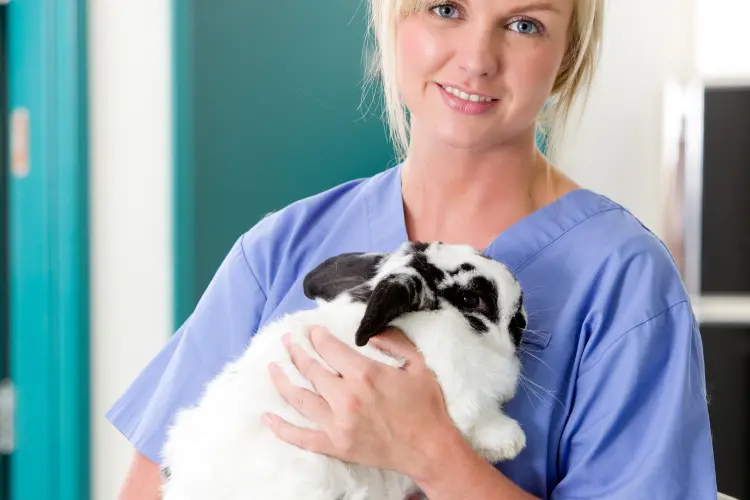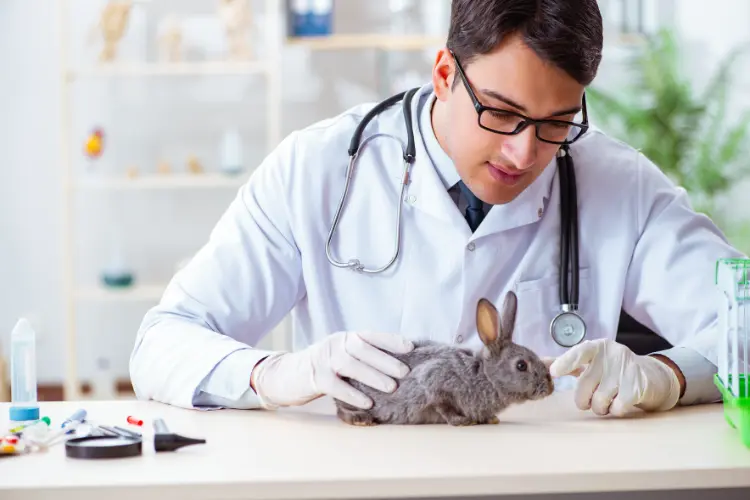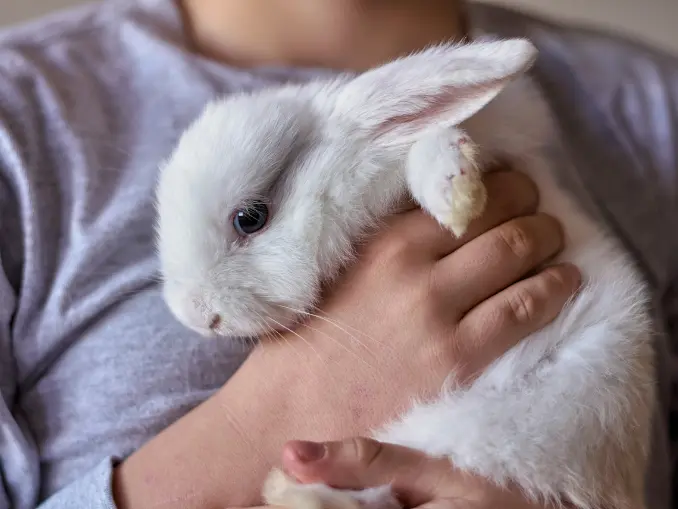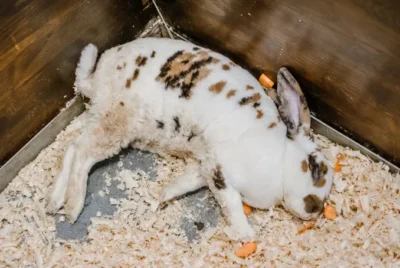The Ultimate Guide to Essential Dental Care for Your Rabbit
Rabbit owners know that providing a comfortable environment and a balanced diet is essential for a happy and healthy bunny. However, one aspect of rabbit care that often gets overlooked is dental care for rabbits. Neglecting your rabbit’s teeth can lead to serious health issues.
In this blog post, we will explore the intricacies of rabbit dental anatomy, common dental problems, diagnostic techniques, treatment options, and preventive measures to ensure your fluffy friend’s dental care for rabbits remains in tip-top shape.
Understanding Rabbit Dental Anatomy
Rabbit dental anatomy is unique and requires special attention. Their teeth, which include incisors, peg teeth, and cheek teeth, grow continuously throughout their lives.
This continuous growth means rabbits must wear down their teeth through regular chewing and grinding of fibrous food to maintain the proper length and function. Failure to do so can result in overgrown teeth and other dental issues.
We will now explore the different parts of a rabbit’s dental anatomy and their roles.
Incisor and cheek teeth
The incisors and cheek teeth play a vital role in the grinding of food for rabbits. Overgrown incisors can protrude beyond the lips, resulting in difficulty chewing, swallowing, and even excessive drooling. Healthy incisors should have a white colour and be cylindrical. They should also possess a chisel-shaped, horizontal edge.
Hold the lower lip with the thumb and forefinger of one hand. Use the other hand to pull the upper lip up and aside. This will allow you to inspect the incisors and the rabbit’s mouth.

Peg teeth and their function
Peg teeth are small, tube-shaped incisors behind the large upper front teeth. Their primary function is to aid in gripping and retaining food while the larger incisor teeth cut and divide it. Healthy peg teeth should have a white coloration, cylindrical shape, and a horizontal, chisel-shaped edge.
If peg teeth are damaged or missing, it can lead to dental issues such as overgrown or misaligned teeth, which may require removal of the affected teeth to prevent further complications.
Tooth growth and normal wear
Rabbit teeth grow fast. Approximately two millimeters per week! Overgrown teeth can make it difficult for rabbits to eat, leading to various health issues. Delayed tooth eruption can deform new tooth tissue, enamel ridging, and even abnormal curvature and intrusive growth, causing lasting health issues.
Continuous tooth replacement, particularly in mandibular cheek teeth and maxillary cheek teeth, is necessary to ensure optimal mastication and keep teeth healthy throughout their lifetime.
Common Dental Problems in Rabbits
Even with proper care, rabbits can still experience dental problems. Common dental issues include malocclusion, dental caries, and periodontal disease, which can all result in severe health complications if left untreated.
We will next explore the common dental problems rabbits encounter and the resulting effects.
Malocclusion and its consequences
Malocclusion is a dental issue in rabbits where the teeth do not meet in the usual manner. Overgrown incisor teeth may curl inward, trapping food and resulting in infections. Overgrowth of cheek teeth can lead to teeth pushing into the jaw bones, causing inflammation and abscesses.
The primary congenital cause leading to improper tooth wear in rabbits is the malformation of the incisors or cheek teeth.

Dental Caries
Dental caries are an infection caused by bacteria. It results in points of decay and demineralization on a tooth. Jaw fractures and broken teeth can result in alterations in the jaw and occlusion of the teeth, leading to improper attrition of teeth and potential development of dental disease.
Systemic disease that alters a rabbit’s typical diet and eating habits may also result in rabbits dental disease. Inadequate nutrition is the most frequent cause of dental disease in pet rabbits.
Periodontal Disease
Periodontal disease affects the supporting structures of the teeth, potentially leading to tooth loss and systemic illness. A variety of issues such as misalignment, overcrowding of teeth, physical trauma and entrapment of foreign objects or ingesta can cause periodontal disease in rabbits.
If left untreated, it could lead to further complications. Signs of periodontal disease may include overgrown teeth, weight loss, soiled bottom, diarrhea or soft feces, watery eyes, drooling, decreased appetite, and malodorous breath.
Periodontal disease can have a significant impact on a rabbit’s overall health, causing pain, discomfort, and potentially leading to malnutrition, depression, and even death.
Read more: Dental Disease in Rabbits: Types, Causes and Treatments
Diagnostic Techniques for Rabbit Dental Issues
Diagnosing dental issues in rabbits involves various techniques, such as physical and oral examinations, blood tests, and radiography. These methods help identify dental problems and determine the appropriate treatment options.
We will examine these diagnostic techniques in greater depth.
Physical and Oral Examination
Physical and oral examinations are crucial for identifying visible dental problems and assessing overall health. During these examinations, veterinarians will inspect the incisors, use a lighted speculum to examine the rest of the oral cavity, and obtain a thorough patient history.
Radiology and endoscopic examination may also be conducted for a more comprehensive diagnosis.
Blood Tests and Their Significance
Blood tests can provide information on systemic health and help determine the need for anesthesia during dental procedures. A Complete Blood Count (CBC), Biochemical Profile, and Coagulation Profile are typically used to diagnose rabbit dental issues.
Blood tests can also aid in evaluating overall health and detecting concurrent diseases, but they are not specific for diagnosing dental diseases in rabbits.
Radiography for Accurate Diagnosis
Radiography is an essential diagnostic tool for accurately diagnosing dental issues and determining appropriate treatment options. Standard radiography, stomatoscopy, and other imaging techniques can be used to examine tooth roots, jawbone, periodontium, nasolacrimal canal, intra-alveolar portion of the teeth, and other abnormalities of the skull and teeth.
Treatment Options for Dental Disease in Rabbits
Once dental issues are diagnosed, various treatment options can be considered. These options include crown height reduction, tooth extractions, abscess treatment, and supportive care.
Continuing on, we’ll discuss these treatment options in depth.
Crown Height Reduction and Occlusal Adjustment
Crown height reduction and occlusal adjustment help restore proper tooth length and alignment. Trimming elongated teeth using a dental burr or high-speed handpiece is a common procedure for crown height reduction in rabbits.
Occlusal adjustment involves realigning and reducing the height of overgrown teeth, typically conducted under general anesthesia to ensure the rabbit’s safety and comfort.
Tooth Extractions and Abscess Treatment
Tooth extractions and abscess treatment address infected or damaged teeth and related complications. The procedure for rabbit tooth extraction involves:
- Cutting the teeth horizontally at the desired length
- Grinding the edges to further shorten if necessary
Using a burr to remove sharp edges and reduce the tooth size
Post-operative care must include analgesia and nutritional support for any patient undergoing a tooth extraction procedure.
Supportive Care and Pain Management
Supportive care and pain management are crucial for maintaining a rabbit’s comfort and overall health during dental treatment. Rabbits undergoing dental treatment may require:
- IV fluids
- Pain relief medication
- Tooth trimming or extraction
- A high-fiber diet
Pain management for rabbits with dental disease typically involves medication such as pain relief and antibiotics, including Meloxicam and Buprenorphine.

Preventing Dental Disease Through Proper Nutrition and Care
Preventing dental disease in rabbits involves providing proper nutrition and care. Incorporating hay, vegetables, pellets, and chew toys into their diet and allowing outdoor grazing help maintain dental health and minimize the risk of dental issues.
We will next delve into these preventive measures in depth.
Importance of Hay in a Rabbit’s Diet
Hay is a vital component of a rabbit’s diet, promoting dental wear and overall health. Timothy hay is recommended for optimal dental health in rabbits. Providing a variety of hays can stimulate the rabbit’s appetite by offering different flavors.
Besides being a source of fiber, hay also contains essential nutrients such as vitamin A and vitamin D, which are beneficial for a rabbit’s overall health.
Suitable Vegetables and Pellets
Vegetables and pellets should be provided in appropriate amounts to supplement a rabbit’s diet and maintain dental health. Some suitable organic, pesticide-free vegetables for a rabbit’s diet include:
- Leaf lettuce
- Romaine
- Kale
- Carrot tops
- Watercress
- Dandelion leaves
- Herbs like basil and dill
Fresh pellets should be high in fiber and devoid of corn or other high-calorie foods. For rabbits, an average-sized adult should have approximately 1/4 cup of pellets daily.
The Role of Chew Toys and Outdoor Grazing
Chew toys and outdoor grazing help promote natural tooth wear and prevent dental issues. Appropriate chew toys for rabbits include:
- Willow balls
- Hay balls
- Plastic balls
- Wood logs or sticks
- Play tables
- Willow tunnels
- Packing paper/cardboard
- Puzzles
Natural toys made from Timothy hay or apple wood sticks
Rabbits can also consume plants during outdoor grazing such as:
- Green beans
- Cilantro
- Wheatgrass
- Timothy grass
- Orchard grass
- Meadow fescue
- Tall fescue
- Crested dog’s-tail
- Clover
- Daisies
- Dandelions
- Nettles
- Apple twigs
- Certain berries
- Cucumber
- Nasturtiums
Regular Dental Check-ups and Home Care
Regular dental check-ups and home care are essential for maintaining a rabbit’s dental health and detecting potential problems early. Annual veterinary examinations, examining your rabbit’s teeth at home, and monitoring eating habits and behavior can help identify and address dental issues promptly.
Up next, we’ll go through these regular check-ups and home care practices in greater detail.
Annual Veterinary Examinations
Annual veterinary examinations help identify dental issues and ensure proper care. During a rabbit’s annual check-up, vets perform the following:
- Oral examination
- Trim any overgrown teeth
- Offer advice on diet and nutrition
- Suggest treatments if necessary
A rabbit’s annual veterinary examination typically involves a comprehensive physical assessment, history-taking, and advice regarding proper husbandry.

Examining Your Rabbit’s Teeth at Home
Examining your rabbit’s teeth at home can help detect signs of dental problems between veterinary visits. Check the teeth for any overgrowth, breakage, looseness, or discoloration. Additionally, feel the outside of the cheeks and lower jaw for any lumps, heat, or signs of pain.
Make the examination process as stress-free as possible for your rabbit by using gentle and slow movements.
Monitoring Eating Habits and Behavior
Monitoring eating habits and behavior can provide early warning signs of dental issues and help maintain overall health. Changes in eating habits, such as:
- refusal or reluctance to eat
- unusual eating habits like only eating certain types of food
- weight loss
- difficulty eating
These can indicate dental problems. By carefully observing changes in eating habits, pet owners can identify potential dental issues and seek timely veterinary care before the condition deteriorates.
Frequently Asked Questions
What can I do for my rabbit with dental problems?
Regular veterinary care, including skull X-rays and incisor trimming by a veterinarian experienced in dealing with rabbits, should be sought for rabbits with dental problems.
Can rabbits live with dental disease?
Rabbits with dental disease can’t be cured, but regular vet visits and treatment can help maintain quality of life.
What is the best type of hay for a rabbit’s dental health?
Timothy hay is the best hay for a rabbit’s dental health.
Dental Care for Rabbits Summary
The health and well-being of our rabbits rely significantly on the care we provide for their dental needs. Rabbit dental care isn’t just about addressing issues when they arise but also about proactive prevention, understanding their unique needs, and establishing a routine that ensures their teeth remain in optimal condition.
As responsible pet owners, we must stay informed and take action, ensuring our furry friends lead comfortable, pain-free lives. With the right knowledge and care, we can ensure our rabbits enjoy a lifetime of healthy nibbles and joyful munches.




